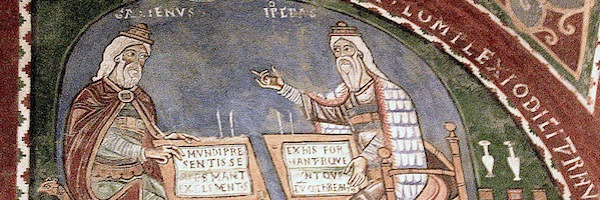Hippocrates, several editions

Life is short, and Art long; the crisis fleeting; experience perilous, and decision difficult. The physician must not only be prepared to do what is right himself, but also to make the patient, the attendants, and externals cooperate.
–Hippocrates
Lister recorded reading ‘Hippocratis Aph ffermij Comment’ on 26 February 1663/4. This book could have been one of several editions of commentaries by Galen or later medieval writers about Hippocrates’ Aphorisms. The doctrines of Hippocrates underwent a strong revival in the seventeenth and eighteenth centuries, particularly his Airs, Waters, and Places; several physicians such as Thomas Sydenham (1624-89), the so-called ‘English Hippocrates’, attempted to find the relationship between weather, climate, the environment and health, particularly as factors in the formation and spread of epidemic disease. 1

Sydenham instituted a new observational approach to study the correlations between disease and weather based on Baconian empirical induction and the experimental program of natural philosophers such as Robert Boyle. 2 According to Sydenham, atmospheric changes and climatic change created specific epidemic ‘constitutions’. 3 He thought that there were five phenomena worthy of sustained attention: ‘heat, cold, moisture, dryness, and emanations from the earth or from living bodies. The first four factors represented the atmospheric constitution, the fifth factor the environmental constitution’. 4 Plague was linked to the ‘environmental constitution’, and other diseases like fever to an ‘atmospheric constitution’. 5
Lister would come to agree with the precepts of neo-Hippocratic revival, later doing his own investigations into the effects of exceptionally cold weather on health. In March 1684, he presented a preliminary paper to the Royal Society investigating the effects of the severe cold on health, particularly the beneficial effects that Hippocrates postulated. 6
- See David Cantor, ed., Reinventing Hippocrates (Aldershot: Ashgate, 2001). ↩
- James C. Riley, The Eighteenth-Century Campaign to Avoid Disease (New York: Macmillan, 1987), 9. ↩
- Matthias Heymann, ‘The Evolution of Climate Ideas and Knowledge’, Wiley Interdisciplinary Reviews: Climate Change 1,4 (2010), 581-597, on 585. ↩
- Heymann, ‘Evolution of Climate’, 585. ↩
- Riley, Campaign, 11. ↩
- Martin Lister, ‘A Discourse Concerning the Rising and Falling of the Quicksilver in the Barometer’, Philosophical Transactions 14 (1684), 790-94. ↩
